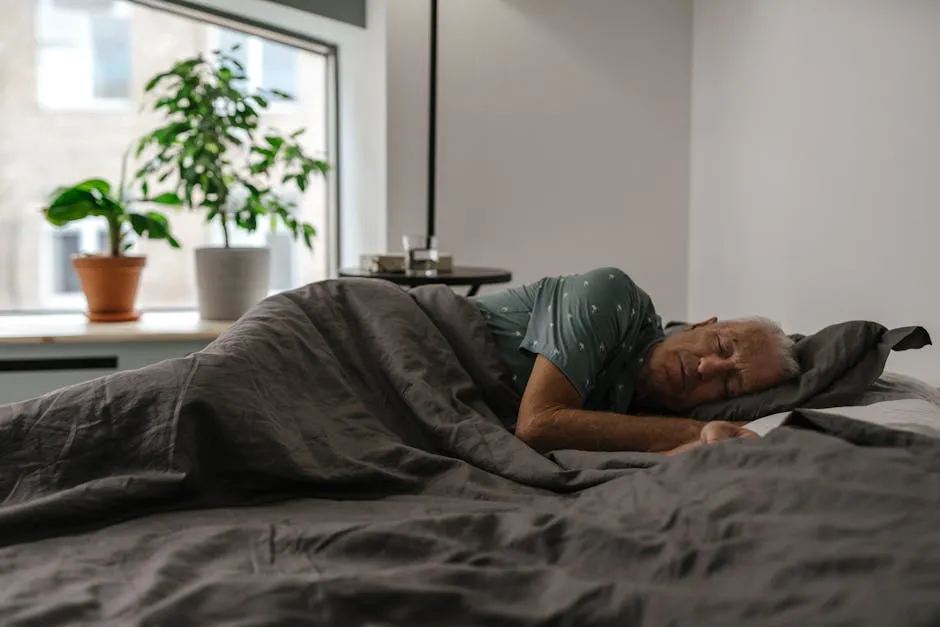
Why Do I Keep Waking Up at 3 AM? Understanding Nocturnal Awakenings
Introduction
Waking up at 3 AM is a common experience for many. It can leave you feeling frustrated and drained. Understanding why this happens is essential for finding effective solutions.
Summary and Overview
There are several reasons you might wake up at 3 AM. Stress is a major factor, making your mind race. Health issues, such as sleep apnea or GERD, can disrupt your rest too. Sleep disorders like insomnia often cause frequent awakenings.
Lifestyle choices play a significant role as well. Consuming caffeine or alcohol close to bedtime can hinder quality sleep. The environment also matters; noise or light can interrupt your rest. Persistently waking up can lead to fatigue, affecting your daily life. If this continues, it’s vital to consult a healthcare professional to explore underlying issues.

Speaking of noise, a great solution to create a peaceful sleeping environment is a White Noise Machine. It produces soothing sounds that can drown out disturbances and help you fall asleep easier. Plus, who doesn’t love the sound of a gentle rainstorm or ocean waves?
Understanding the effects of caffeine on your sleep can be vital. why no caffeine after prp
Understanding Nighttime Awakenings
To grasp why you might wake at 3 AM, it helps to know how sleep cycles work. A typical sleep cycle lasts about 90 minutes, alternating between light and deep sleep. Light sleep is easier to wake from, especially later in the night.
During deep sleep, your body repairs itself. However, as the night progresses, you spend more time in lighter sleep stages. This means you’re more likely to awaken at 3 AM. If stress or discomfort arises, it can jolt you awake during these transitions. Understanding this cycle can help you address the root causes of your nighttime awakenings.

Sleep Cycles and Their Role
Understanding sleep cycles is key to grasping nighttime awakenings. Sleep consists of several stages, including light sleep, deep sleep, and REM (Rapid Eye Movement) sleep. Each cycle lasts about 90 minutes and repeats throughout the night.
During light sleep, you drift in and out of consciousness. This stage makes you more prone to waking up. Deep sleep follows, where your body repairs itself and rejuvenates. Finally, REM sleep is when dreaming occurs, and your brain becomes highly active.
As the night progresses, you spend more time in lighter sleep stages. This shift can lead to waking up, especially if there’s stress or discomfort. Recognizing these transitions can help explain why you might find yourself awake at 3 AM.
Common Causes of Waking Up at 3 AM
Stress and Anxiety
Stress plays a significant role in nighttime awakenings. When you’re stressed, your body activates its fight-or-flight response. This reaction increases your heart rate and keeps your mind racing, making sleep elusive.
Common stressors include work pressure, relationship issues, or financial worries. These concerns often intensify when the distractions of daily life fade away at night. Your mind may replay worries, leading to anxiety and disrupted sleep.
To combat this, consider relaxation techniques. Deep breathing, meditation, or journaling before bed can help calm your mind. For those who find journaling hard, a Journal for Stress Relief can be your best friend! Writing down your thoughts can help clear your mind and reduce anxiety before hitting the pillow.

Health Conditions
Certain health issues can also disrupt your sleep. Conditions like sleep apnea, GERD (gastroesophageal reflux disease), and depression are common culprits.
Sleep apnea causes breathing interruptions during sleep, leading to frequent awakenings. GERD can trigger discomfort, making it hard to stay asleep. Depression often results in sleep disturbances, including waking up in the middle of the night.
These health issues can affect sleep quality and lead to daytime fatigue. If you suspect a medical condition is disrupting your rest, it’s important to consult a healthcare professional. Identifying and addressing these issues can significantly improve your sleep.
Lifestyle Factors
Your daily habits can significantly impact your sleep. Caffeine and alcohol are major players here. Consuming caffeine, even in the afternoon, can keep you alert at night. Alcohol might make you sleepy initially, but it disrupts your sleep later. It’s a double-edged sword that can lead to waking up in the middle of the night.
Screen time is another culprit. The blue light from your devices can trick your brain into thinking it’s daytime. This can hinder melatonin production, the hormone that regulates sleep. To improve your sleep quality, consider reducing screen time an hour before bed.
Sleep hygiene is crucial too. This means creating a restful environment for sleep. Keep your bedroom dark, quiet, and cool. Establishing a consistent sleep schedule also helps. Going to bed and waking up at the same time each day trains your body for better rest. Together, these factors can make a significant difference in your sleep quality.

If you struggle with sleep hygiene, consider investing in Blackout Curtains to block out any pesky light. Trust me, your sleep will thank you!
Aging and Sleep Changes
As we age, our sleep patterns tend to shift. Older adults often experience lighter sleep and fewer deep sleep stages. This change makes waking up in the night more common. It can be frustrating, especially if you find it challenging to drift back to sleep.
Many older adults also face more frequent awakenings. This might be due to physical discomfort or the need for bathroom breaks. Hormonal changes and medications can also play a role in these disturbances. It’s essential to recognize that these changes are a normal part of aging.
Understanding these shifts can help you adapt your sleep strategies. Implementing proper sleep hygiene practices can improve your overall rest. Finding ways to enhance your sleep environment may also help you sleep better as you age.

Tips for Improving Sleep Quality
Create a Sleep-Friendly Environment
Optimizing your bedroom can greatly enhance your sleep experience. Start by reducing noise—consider using earplugs or white noise machines. Next, control the light in your room. Use blackout curtains to block out disruptions. The temperature also matters; a cool room promotes better sleep. Make sure your mattress and pillows are comfortable too. A cozy, quiet, and dark space sets the stage for a good night’s sleep.

If you’re looking for extra comfort, a Mattress Topper for Extra Comfort can be a game-changer! It’s like giving your bed a hug.
Establish a Consistent Routine
Consistency is vital for better sleep. Aim to go to bed and wake up at the same time every day. This habit reinforces your body’s natural sleep-wake cycle. Even on weekends, try to maintain this schedule. It helps regulate your internal clock, making it easier to fall asleep and wake up refreshed. A consistent routine can significantly improve your sleep quality over time.

Manage Stress and Anxiety
Managing stress and anxiety is crucial for better sleep. When stress levels rise, your body reacts, making it tough to stay asleep. To counter this, try relaxation techniques. Mindfulness meditation can help center your thoughts. Simply sit quietly, focus on your breath, and let go of racing thoughts.
Breathing exercises are also effective. Inhale deeply through your nose for four counts, hold for four, then exhale through your mouth for four. Repeat this several times. You can also keep a journal to jot down worries before bed, which can clear your mind. Incorporating these practices into your routine can significantly improve your sleep quality.

For an added boost, consider using a Breathing Exercise Guidebook. It can provide you with techniques to help you relax and breathe your way to better sleep.
When to Seek Professional Help
If waking up at 3 AM becomes a frequent occurrence, it may be time to consult a doctor or sleep specialist. Persistent awakenings can indicate underlying issues, such as sleep disorders. If your sleep is disrupted for weeks, don’t hesitate to reach out for help.
Professional evaluation may include a sleep study to investigate your sleep patterns. Treatments for sleep disorders can vary. Options include cognitive behavioral therapy, medication, or lifestyle changes. Identifying the root cause is vital for effective treatment. Prioritizing your sleep health can lead to lasting improvements.

FAQs
Why do I consistently wake up at 3 AM?
Waking up at 3 AM happens to many people. Stress is a major factor. When you’re stressed, your body enters a heightened state of alertness. This can cause your mind to race, making it harder to stay asleep. Lifestyle factors also contribute. Consuming caffeine or alcohol too close to bedtime can disrupt your rest. Additionally, an uncomfortable sleep environment, like noise or light, can interrupt your sleep cycle.
What can I do to stop waking up at 3 AM?
Improving your sleep quality starts with establishing a consistent bedtime routine. Aim to go to bed and wake up at the same time daily. Create a sleep-friendly environment by keeping your room dark and cool. Limit screen time an hour before bed to help your brain unwind. Consider relaxation techniques like deep breathing or gentle stretching. Lastly, avoid caffeine and heavy meals in the evening to promote better sleep.
Is waking up at 3 AM a sign of a sleep disorder?
Frequent awakenings can indicate underlying sleep issues. Conditions like insomnia or sleep apnea often lead to disrupted sleep. If you find yourself awake for long periods, it might be time to consult a sleep specialist. They can help diagnose any potential sleep disorders and recommend appropriate treatments or lifestyle changes.
How does stress affect my sleep?
Stress negatively impacts sleep by increasing cortisol levels. This hormone can keep you awake and alert during the night. When stress levels are high, your body may enter a state of hyperarousal. This makes it difficult to relax and fall back asleep. Finding effective stress management techniques, such as mindfulness or journaling, can improve your overall sleep quality.
Should I seek help if I wake up at 3 AM regularly?
If waking up at 3 AM becomes a pattern, it may be wise to seek professional help. Persistent sleep disturbances can lead to fatigue and impact daily life. Consulting a healthcare provider can help identify any underlying issues. They can guide you toward effective treatments and strategies to enhance your sleep quality.
Please let us know what you think about our content by leaving a comment down below!
Thank you for reading till here 🙂 If you’re thinking about improving your nighttime routine, consider a Sleep Mask to block out light and give yourself the best chance at restful sleep!
All images from Pexels




